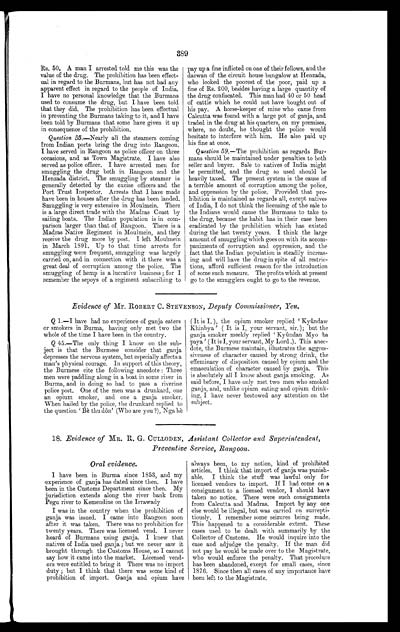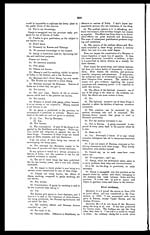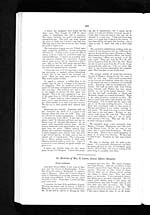Medicine - Drugs > Report of the Indian Hemp Drugs Commission, 1894-1895 > Volume VII > Evidence of Burma witnesses
(407) Page 389
Download files
Individual page:
Thumbnail gallery: Grid view | List view

389
Rs. 50. A man I arrested told me this was the
value of the drug. The prohibition has been effect-
ual in regard to the Burmans, but has not had any
apparent effect in regard to the people of India.
I have no personal knowledge that the Burmans
used to consume the drug, but have been told
that they did. The prohibition has been effectual
in preventing the Burmans taking to it, and I have
been told by Burmans that some have given it up
in consequence of the prohibition.
Question, 35.—Nearly all the steamers coming
from Indian ports bring the drug into Rangoon.
I have served in Rangoon as police officer on three
occasions, and as Town Magistrate. I have also
served as police officer. I have arrested men for
smuggling the drug both in Rangoon and the
Henzada district. The smuggling by steamer is
generally detected by the excise officers and the
Port Trust Inspector. Arrests that I have made
have been in houses after the drug has been landed.
Smuggling is very extensive in Moulmein. There
is a large direct trade with the Madras Coast by
sailing boats. The Indian population is in com-
parison larger than that of Rangoon. There is a
Madras Native Regiment in Moulmein, and they
receive the drug more by post. I left Moulmein
in March 1891. Up to that time arrests for
smuggling were frequent, smuggling was largely
carried on, and in connection with it there was a
great deal of corruption among the police. The
smuggling of hemp is a lucrative business; for I
remember the sepoys of a regiment subscribing to
pay up a fine inflicted on one of their fellows, and the
darwan of the circuit house bungalow at Henzada,
who looked the poorest of the poor, paid up a
fine of Rs. 200, besides having a large quantity of
the drug confiscated. This man had 40 or 50 head
of cattle which he could not have bought out of
his pay. A horse-keeper of mine who came from
Calcutta was found with a large pot of ganja, and
traded in. the drug at his quarters, on my premises,
where, no doubt, he thought the police would
hesitate to interfere with him. He also paid up
his fine at once.
Question 59.—The prohibition as regards Bur-
mans should be maintained under penalties to both
seller and buyer. Sale to natives of India might
be permitted, and the drug so used should be
heavily taxed. The present system is the cause of
a terrible amount of corruption among the police,
and oppression by the police. Provided that pro-
hibition is maintained as regards all, except natives
of India, I do not think the licensing of the sale to
the Indians would cause the Burmans to take to
the drug, because the habit has in their case been
eradicated by the prohibition which has existed
during the last twenty years. I think the large
amount of smuggling which goes on with its accom-
paniments of corruption and oppression, and the
fact that the Indian population is steadily increas-
ing and will have the drug in spite of all restric-
tions, afford sufficient reason for the introduction
of some such measure. The profits which at present
go to the smugglers ought to go to the revenue.
Evidence of Mr. ROBERT C. STEVENSON, Deputy Commissioner, Yeu.
Q 1.—I have had no experience of ganja eaters
or smokers in Burma, having only met two the
whole of the time I have been in the country.
Q 45.—The only thing I know on the sub-
ject is that the Burmese consider that ganja
depresses the nervous system, but especially affects a
man's physical courage. In support of this theory,
the Burmese cite the following anecdote: Three
men were paddling along in a boat in some river in
Burma, and in doing so had to pass a riverine
police post. One of the men was a drunkard, one
an opium smoker, and one a ganja smoker.
When hailed by the police, the drunkard replied to
the question 'Bè thu dôn' (Who are you?), Nga liè
( It is I. ), the opium smoker replied 'Kyûndaw
Khinbya' (It is I, your servant, sir.); but the
ganja smoker meekly replied 'Kyûndan Myo ba
paya' ( It is I, your servant, My Lord. ). This anec-
dote, the Burmese maintain, illustrates the aggres-
siveness of character caused by strong drink, the
effeminacy of disposition caused by opium and the
emasculation of character caused by ganja. This
is absolutely all I know about ganja smoking. As
said before, I have only met two men who smoked
ganja, and, unlike opium eating and opium drink-
ing, I have never bestowed any attention on the
subject.
18. Evidence of MR. R. G. CULLODEN, Assistant Collector and Superintendent,
Preventive Service, Rangoon.
Oral evidence.
I have been in Burma since 1853, and my
experience of ganja has dated since then. I have
been in the Customs Department since then. My
jurisdiction extends along the river bank from
Pegu river to Kemendine on the Irrawady
I was in the country when the prohibition of
ganja was issued. I came into Rangoon soon
after it was taken. There was no prohibition for
twenty years. There was licensed vend. I never
heard of Burmans using ganja. I knew that
natives of India used ganja; but we never saw it
brought through the Customs House, so I cannot
say how it came into the market. Licensed vend-
ors were entitled to bring it There was no import
duty; but I think that there was some kind of
prohibition of import. Ganja and opium have
always been, to my notion, kind of prohibited
articles. I think that import of ganja was punish-
able. I think the stuff was lawful only for
licensed vendors to import. If I had come on a
consignment to a licensed vendor, I should have
taken no notice. There were such consignments
from Calcutta and Madras. Import by any one
else would be illegal, but was carried on surrepti-
tiously. I remember some seizures being made.
This happened to a considerable extent. These
cases used to be dealt with summarily by the
Collector of Customs. He would inquire into the
case and adjudge the penalty. If the man did
not pay he would be made over to the Magistrate,
who would enforce the penalty. That procedure
has been abandoned, except for small eases, since
1876. Since then all cases of any importance have
been left to the Magistrate.
Set display mode to: Large image | Zoom image | Transcription
Images and transcriptions on this page, including medium image downloads, may be used under the Creative Commons Attribution 4.0 International Licence unless otherwise stated. ![]()
| India Papers > Medicine - Drugs > Report of the Indian Hemp Drugs Commission, 1894-1895 > Volume VII > Evidence of Burma witnesses > (407) Page 389 |
|---|
| Permanent URL | https://digital.nls.uk/74911819 |
|---|




